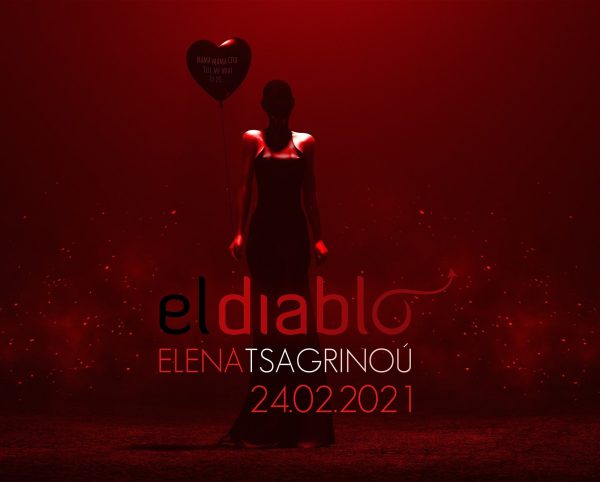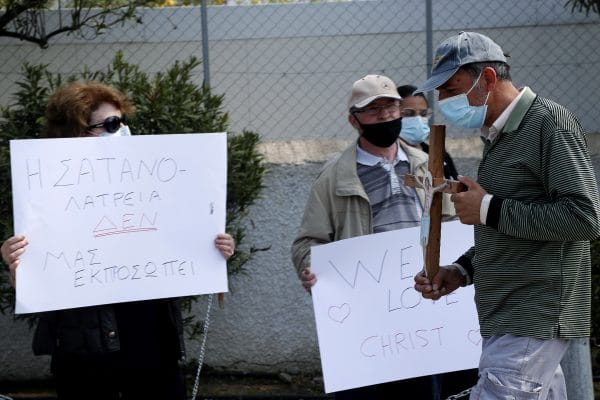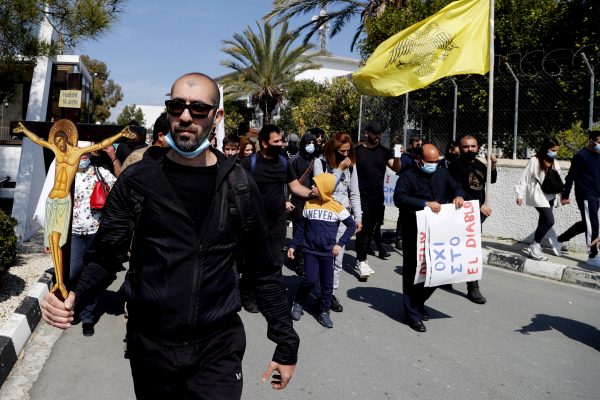Cyprus’ entry to Eurovision 2021
titled “El Diablo” sparked outrage and protests due to its satanic
message. Here’s a look at the controversy.
By

Eurovision is an international song contest with massive appeal and influence. It has been a TV staple for decades, it includes over 50 countries and it is watched by hundreds of millions of viewers every year. Considering these facts, you better believe that the elite will use this unmissable platform to push its agenda.
In my article about the 2019 Eurovision finale,
I highlighted the blatant symbolism on display during the show which
culminated with a disturbing ritualistic performance by Madonna.
A
screenshot of Madonna’s performance at Eurovision 2019 featuring masked
dancers being
“killed” by Madonna’s breath of death combined with the
Statue of Liberty breaking down.
Some say that this performance
predicted the coming of COVID-19.
Eurovision was canceled in 2020 due to the pandemic but it is right back at it this year.
In November 2020, the Cyprus Broadcasting Corporation (CyBC) announced Greek singer Elena Tsagrinou as the Cypriot representative for the Eurovision Song Contest 2021 with the song El Diablo. Prior to her selection, Tsagrinou called Eurovision an institution that she’d been following for many years. She added that if the right song was found, it would be her pleasure and honor to compete.
Apparently, the “right song was found” … and it is about the singer “giving her heart” to the devil.
On February 28th 2021, the song was released and it was not well received. The Orthodox Church stated that the song had a satanic message and Cypriots took to the streets to protest it.
On the other hand, Cyprus’ state broadcaster about falling in love with a “bad boy”. The singer even added that it is about abusive relationships and #metoo. Here’s a look at the song.
Dancing With the Devil
This song does not require in-depth analysis. It’s an ultra-generic pop song that actually sounds like Lady Gaga’s Bad Romance. Coincidentally enough, Bad Romance is also about a “toxic relationship” with satanic undertones.
The song was written by industry veterans (Jimmy “Joker” Thornfeldt,
Laurell Barker, Oxa, and Thomas Stengaard). Here are the lyrics.
Chorus:
I fell in love, I fell in lovе
I gave my heart to el diablo, еl diablo
I gave it up, I gave it up
Because he tells me I’m his angel, I’m his angel
Those are the two verses:
Tonight we gonna burn in a party
We wild as fire that’s on the loose
Hotter than siracha on our bodies
Ta-Taco tamale, yeah, that’s my mood
All this spicy melts my icy edges
Baby, it’s true
Tonight we gonna burn in a party
It’s Heaven in Hell with youTonight we gonna dance in the moonlight
Droppin’ our lashes on the floor
Hair flip-flip, made you look twice
Touch me, touch me, mi amor
All this spicy melts my icy edges
Baby, for sure
Tonight we gonna dance in the moonlight
And then we gonna do it some more
First of all, I don’t understand how an entire team of people was needed to write these lyrics. Second, is there anything in that song that remotely alludes to #meetoo or an abusive partner? The lyrics make it very clear that the singer is having super sexy fun with El Diablo and that her mood is “Ta-taco tamale”. I’m not quite sure what that means but I assume that it’s positive.
Also, the video does not contain any references to any kind of relationship neither. In fact, there’s nearly nothing worth analyzing in that video … except for the worst product placement I’ve ever seen.

As the singer praises the devil, we suddenly see some fine Head and Shoulders™ products. Because if there’s one thing that the devil doesn’t like, it’s dandruff.

Uhh… Elena … there’s no running water around you … you’ll basically be standing in a black void with a handful of shampoo.
Towards the end of the video, some guys (who appear to be painted black) creep towards the singer.

The men lift up Helena as she poses in a Baphomet-style “as above so below” sign.
I’m
not sure what these men are supposed to represent and why they’re
painted black. However, as we watch this perplexing scene, we hear
children in the background chanting repeatedly “I love El Diablo”.
That’s probably what caused some people to say: “That’s it. I’m going out to protest this crap. But first, let me grab the largest crucifix I can find.”
Protests

A protestor holds a cross outside Cyprus’ national broadcasting building during a protest in Nicosia, Cyprus on March 6.
The release of El Diablo sparked outrage and controversy in Cyprus due to its satanic meaning.
Dozens of Orthodox Christian faithful held up wooden
crosses and sang Church hymns outside of Cyprus’ state broadcaster on
Saturday to demand the withdrawal of the country’s controversial entry
for the Eurovision song contest — titled “El Diablo” — that they say
promotes satanic worship.
Some of the protesters, including families, held up placards reading in Greek, “We’re protesting peacefully, no to El Diablo,” “Repent and return to Christ” and “Christ saves, Diablo kills.”
The broadcaster and the singer of the song insist it has been misinterpreted and the song is actually about an abusive relationship between two lovers.
The protest came several days after the powerful Orthodox Church called for the withdrawal of the song that it said mocked the country’s moral foundations by advocating “our surrender to the devil and promoting his worship.”
The Holy Synod, the Church’s highest decision-making body, said in a statement that the song “essentially praises the fatalistic submission of humans to the devil’s authority” and urged the state broadcaster to replace it with one that “expresses our history, culture, traditions and our claims.”
– AP, Protesters say out with Cyprus’ ‘Satanic’ Eurovision entry
The broadcaster and the Cypriot government responded to the controversy by fully backing the song.
The state broadcaster insisted that the entry won’t be withdrawn, but its board chairman, Andreas Frangos, conceded that organizers should have done a better job explaining the core message of the song, whose lyrics include, “I gave my heart to el diablo…because he tells me I’m his angel.”
Even the Cypriot government waded into the controversy, with Presidential spokesman Viktoras Papadopoulos saying that although the views of dissenters are respected, the government cannot quash freedom of expression.
“The Government fully respects creative intellectual and artistic freedom that cannot be misinterpreted or limited because of a song’s title, and unnecessary dimensions should not be attributed,” Papadopoulos said in a written statement.
The song’s performer, Greek artist Elena Tsagrinou, said that the song is about a woman who cries out for help after falling for a “bad boy” known as “El Diablo” and coming to identify and bond with her abuser. Tsagrinou insisted that any other interpretation is “unfounded.”
“The song sends a strong message, one against any form of abuse, such as the one conveyed in ‘El Diablo,’” Tsagrinou told The Associated Press in a written statement. “In these ‘Me Too Movement’ times that message is extremely relevant and can be felt not only in Cyprus but also across Europe and beyond.”
– Ibid.
Reread the lyrics and tell me where there’s a “cry for help” and a “strong message against abuse”. Because all I got from that song is “taco tamale”. In the end, it is yet another basic pop song that tries to make satanism appear cool, fun and sexy.
In Conclusion
El Diablo was written by a group of industry veterans that are not from Cyprus. The song was “imported” there and Elena Tsagrinou was chosen to perform it. Furthermore, I suspect that Cyprus was selected specifically because the Orthodox Church is highly influential in that area. In other words, this is about the occult elite poking and prodding pockets of Christianity around the world.
This controversy proves that the elite’s agenda is not only reserved for international superstars. Local and regional celebrities are also targeted to make sure that every single market around the world is tainted by this agenda.
And when people ask for a song that actually represents them, this is the response they get from local media and government: I love El Diablo.
P.S. If you appreciated this article, please consider showing your support through a small monthly donation on Patreon. If you prefer, you can also make a one-time donation here.
Your support will help this site navigate these difficult times as it
continues to provide vital information and analysis on a regular basis.
Thank you!



No hay comentarios:
Publicar un comentario